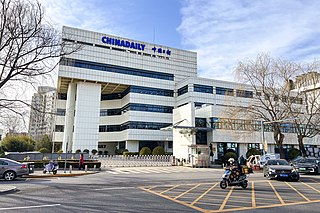Related Research Articles
Media bias occurs when journalists and news producers show bias in how they report and cover news. The term "media bias" implies a pervasive or widespread bias contravening of the standards of journalism, rather than the perspective of an individual journalist or article. The direction and degree of media bias in various countries is widely disputed.

The history of British newspapers begins in the 17th century with the emergence of regular publications covering news and gossip. The relaxation of government censorship in the late 17th century led to a rise in publications, which in turn led to an increase in regulation throughout the 18th century. The Times began publication in 1785 and became the leading newspaper of the early 19th century, before the lifting of taxes on newspapers and technological innovations led to a boom in newspaper publishing in the late 19th century. Mass education and increasing affluence led to new papers such as the Daily Mail emerging at the end of the 19th century, aimed at lower middle-class readers.
The mass media in the People's Republic of China primarily consists of television, newspapers, radio, and magazines. Since the start of the 21st century, the Internet has also emerged as an important form of mass media and is under the direct supervision and control of the Chinese government and ruling Chinese Communist Party (CCP). Media in China is strictly controlled and censored by the CCP, with the main agency that oversees the nation's media being the Central Propaganda Department of the CCP. The largest media organizations, including the China Media Group, the People's Daily, and the Xinhua News Agency, are all controlled by the CCP.

The People's Daily is the official newspaper of the Central Committee of the Chinese Communist Party (CCP). It provides direct information on the policies and viewpoints of the CCP in multiple languages.

The propaganda model is a conceptual model in political economy advanced by Edward S. Herman and Noam Chomsky to explain how propaganda and systemic biases function in corporate mass media. The model seeks to explain how populations are manipulated and how consent for economic, social, and political policies, both foreign and domestic, is "manufactured" in the public mind due to this propaganda. The theory posits that the way in which corporate media is structured creates an inherent conflict of interest and therefore acts as propaganda for anti-democratic elements.

ABC is a Spanish national daily newspaper. Along with El Mundo and El País, it is one of Spain's three newspapers of record.

A political campaign is an organized effort which seeks to influence the decision making progress within a specific group. In democracies, political campaigns often refer to electoral campaigns, by which representatives are chosen or referendums are decided. In modern politics, the most high-profile political campaigns are focused on general elections and candidates for head of state or head of government, often a president or prime minister.

China Daily is an English-language daily newspaper owned by the Publicity Department of the Chinese Communist Party.

The China Times is a daily Chinese-language newspaper published in Taiwan and one of the most widely circulated newspapers in Taiwan. Founded in 1950, the China Times Group was acquired by food and media conglomerate Want Want, which also owns TV stations CTV and CTiTV.
Self-censorship is the act of censoring or classifying one's own discourse. This is done out of fear of, or deference to, the sensibilities or preferences of others and often without overt pressure from any specific party or institution of authority. Self-censorship is often practiced by film producers, film directors, publishers, news anchors, journalists, musicians, and other kinds of authors including individuals who use social media.
Elections in the People's Republic of China occur under a one-party authoritarian political system controlled by the Chinese Communist Party (CCP). Direct elections, except in the special administrative regions of Hong Kong and Macau, occur only at the local level people's congresses and village committees, with all candidate nominations preapproved by the CCP. By law, all elections at all levels must adhere to the leadership of the CCP.
Watchdog journalism is a form of investigative journalism where journalists, authors or publishers of a news publication fact-check and interview political and public figures to increase accountability in democratic governance systems.

Tabloid journalism is a popular style of largely sensationalist journalism which takes its name from the tabloid newspaper format: a small-sized newspaper also known as half broadsheet. The size became associated with sensationalism, and tabloid journalism replaced the earlier label of yellow journalism and scandal sheets. Not all newspapers associated with tabloid journalism are tabloid size, and not all tabloid-size newspapers engage in tabloid journalism; in particular, since around the year 2000 many broadsheet newspapers converted to the more compact tabloid format.

La Vanguardia is a Spanish daily newspaper, founded in 1881. It is printed in Spanish and, since 3 May 2011, also in Catalan. It has its headquarters in Barcelona and is Catalonia's leading newspaper.
Diario 16 was a Spanish-language daily newspaper published in Madrid, Spain, between 1976 and 2001. The 16 of the title refers to the sixteen founders of Grupo 16, publishers of the weekly news magazine Cambio 16.
In communication, media are the outlets or tools used to store and deliver semantic information or contained subject matter, described as content. The term generally refers to components of the mass media communications industry, such as print media (publishing), news media, photography, cinema, broadcasting, digital media, and advertising. Each of these different channels requires a specific, thus media-adequate approach, to a successful transmission of content.

Southern Metropolis Daily (SMD) is a for-profit tabloid newspaper located in Guangzhou city, China, and its circulation is throughout the greater Guangdong and Pearl River Delta region. SMD is a constituent of the Nanfang Media Group, which is under the supervision of the Guangdong Provincial Committee of the Chinese Communist Party (CCP). The newspaper publishes daily, with 72 pages and multiple sections relating to consumer products, international affairs, sports, and other topics of the public interest.
Mass media regulations or simply media regulations are a form of media policy with rules enforced by the jurisdiction of law. Guidelines for mass media use differ across the world. This regulation, via law, rules or procedures, can have various goals, for example intervention to protect a stated "public interest", or encouraging competition and an effective media market, or establishing common technical standards. The principal targets of mass media regulation are the press, radio and television, but may also include film, recorded music, cable, satellite, storage and distribution technology, the internet, mobile phones etc. It includes the regulation of independent media.

Post-truth politics, also described as post-factual politics or post-reality politics, amidst varying academic and dictionary definitions of the term, refer to a recent historical period where political culture is marked by public anxiety about what claims can be publicly accepted facts.
The mass media in the Czech Republic refers to mass communication methods through broadcasting, publishing, and the Internet and their influence on population.
References
- ↑ International Communication Gazette. (October 2001) vol. 63 no. 5 435-450 China's State-Run Tabloids Retrieved 20 Jul 2013
- ↑ Huang, Chengju (2021-03-08), Conboy, Martin; Eldridge II, Scott A. (eds.), "The rise and fall of tabloid journalism in post-Mao China", Global Tabloid (1 ed.), Routledge, pp. 183–197, doi:10.4324/9780429320880-12, ISBN 978-0-429-32088-0, S2CID 233797018
- ↑ Zhao, Yuezhi (2000-06-01). "From Commercialization to Conglomeration: The Transformation of the Chinese Press Within the Orbit of the Party State". Journal of Communication . 50 (2): 3–26. doi:10.1111/j.1460-2466.2000.tb02839.x. ISSN 0021-9916.
- ↑ Gittings, John (2001-06-11). "The Aids scandal China could not hush up". The Guardian . ISSN 0261-3077 . Retrieved 2024-11-27.
- ↑ Bandurski, David (2008-05-19). "Facing crisis, one of Sichuan's top commercial tabloids returns briefly to its party-paper roots". China Media Project. Retrieved 2024-11-27.